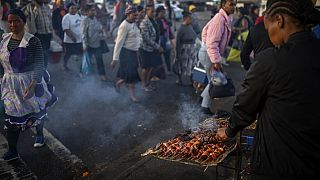Uganda
A courier picks up a supply of frozen breast milk from the offices of ATTA.
The charity supplies safe, clean breast milk to women who cannot produce their own.
Caroline Ikendi was desperate for help before she discovered the service.
Early last year, Ikendi was in distress after undergoing an emergency Caesarean section to remove a stillborn baby and save two others.
Doctors said one of the preterm babies had a 2% chance of living.
If the babies didn’t get breast milk — which she didn’t have — Ikendi could lose them as well.
And so began a desperate search for donors. She was lucky with a neighbour, a woman with a newborn baby to feed who was willing to donate a few millilitres at a time.
The neighbour helped as much as she could until Ikendi discovered the ATTA Breastmilk Community.
The charity was founded by a woman whose baby died after a complicated childbirth, she started lactating and decided she would donate her milk to women with babies who could benefit.
Ikendi was given free donated milk until her remaining babies were strong enough to be discharged.
She admits she initially had concerns about the safety of the produce she was advised to give her children.
"The first time I heard it in the hospital that since you don’t have breast milk we are going to get it from someone else, I am like how? No, people do alcohol, people have different diseases what if my babies get what? Thinking that the breast milk comes with all those challenges," she says.
Ikendi explains that when she gave birth prematurely at 7 months her breasts had not grown, she didn't have any milk and she was deeply concerned about the welfare of her surviving babies.
“The doctors were like no they have to have breast milk, not formula. These babies need to gain weight and it's only breastmilk that can help," she says.
"So, I didn’t have breast milk. I tried all methods. I got pumps, but it really failed. I am thinking it’s because of also the stress I had at the time, I was so frustrated, I was actually depressed," she adds.
ATTA Breastmilk Community was launched in 2021, it's a registered non-profit, backed by grants from organizations and individuals.
It's the only group outside a hospital setting in Uganda that conserves breast milk in substantial amounts.
ATTA receives calls for support from hospitals and homes with babies born too soon or too sick to latch onto their mothers’ breasts.
Since the launch, more than 200 mothers have donated breast milk to support over 450 babies.
According to ATTA's records, 600 litres of milk have been delivered to babies in need during that period.
The group's Administrator, Racheal Akugizibwe, says the job is immensely rewarding.
“When you wake up and you have a message from a mother: 'These are your babies', you know that’s a celebration for the whole team, you see babies you took care of the ones you gave milk when they were say 500 or 700 grams and they are 1 year they are 2 years that is a celebration for us, those are the things that keep us moving,” says Akugizibwe
It's a sentiment shared by Lelah Wamala who donates her breast milk.
She became involved through a bereaved friend.
“There is a mum who reached out to me through a friend of mine, she had triplets unfortunately one passed away and through that depression, crying and everything her body stopped producing milk, so when she stopped getting milk and yet these little ones also needed it, they were two, they reached out to me they were like we know you donate milk but can you please help us, so I did help them, I even directed them to ATTA. And now the babies are doing okay and she always sends me a Mother’s Day cake on Mother’s Day so she thanks me every day," says Wamala.
ATTA calls for donors via social media platforms, including Instagram.
Women who want to donate must provide samples for testing, including for HIV and Hepatitis B and C, the laboratory tests are done by an independent medical group, Rocket Health Uganda.
There are formal conversations during which ATTA tries to learn more about potential donors and motivations.
Those who pass the screening are given storage bags and instructed in safe handling.
In the beginning, ATTA would match a donor to a recipient, but it proved unsustainable because of the pressure it put on donors. ATTA then started collecting and storing breast milk, and donors and recipients didn't know each other.
Akugizibwe says the group gets more requests for support than it can meet.
Challenges include procuring storage bags in large quantities as well as the costs of testing. Donors are required to own freezers, a financial obstacle for some.
“We take them through the process of handling it. When you are going to pump milk, wash your hands, clean up, do this, pump the milk and then they store it in their freezers then we go and pick it. We do not have a pumping centre, probably in the future we shall have pumping centres, for those ones probably who are going to work and have excess milk, they can pass by and pump but for now they pump from their homes and we pick milk from their homes,” explains Akugizibwe.
ATTA’s goal is to set up a fully-fledged breast milk bank with the ability to pasteurize.
The service is necessary in a country where an unknown number of women suffer for lack of lactation support, said Dr. Doreen Mazakpwe, a lactation specialist who collaborates with ATTA.
Mazakpwe, a consultant at a private hospital outside Kampala, cites a range of lactation issues mothers can face, from sore nipples to babies born too sick or too weak to suckle and stimulate milk production.
Sometimes advice and instruction are all that are needed to help mothers lactate, freeing up donations for other babies.
“Sometimes we work with the mother to establish her own supply because that’s the best milk for baby because it is made specifically for the baby, however there are sometimes when the breastmilk supply is just not coming through as fast as we want it so this is when we engage organizations like ATTA," she says.
The work is challenging in a socially conservative society where such a pioneering service raises eyebrows.
Women who don't breastfeed are frowned upon, according to Ikendi.
Some recipients even voice fears that babies who drink donated breast milk might inherit the bad habits of their donors.
The World Health Organization recommends exclusively breastfeeding children from within the first hour of birth until they are 6 months old.










01:13
Uganda reopens border with M23-held eastern DRC
01:00
Pix of the Day: July 3, 2025
01:45
From Uganda to NYC: Zohran Mamdani's rise in American politics
01:22
Ugandan-born Zohran Mamdani declares victory in New York Democratic mayoral primary
Go to video
World Bank resumes Uganda loans after anti-gay law freeze
11:18
Africa Day: AU renews call for reparative justice {Business Africa}